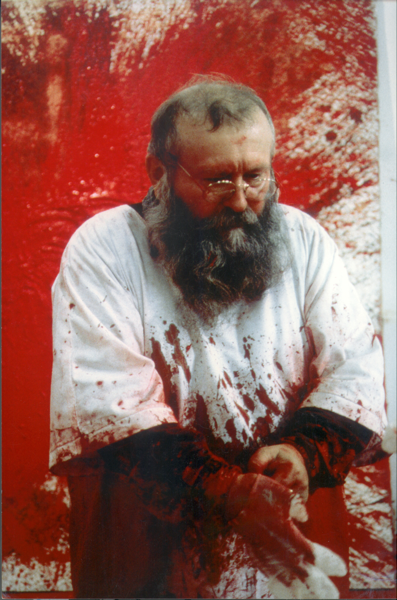Art & Exhibitions
Museo Jumex Cancels Hermann Nitsch Show Over Animal Rights Protest
The 76-year-old artist is known for his performances involving carcasses and blood.

The 76-year-old artist is known for his performances involving carcasses and blood.

Coline Milliard

At 76, Viennese Actionist Hermann Nitsch still has the power to shock. The Museo Jumex in Mexico City has suspended an exhibition by the controversial Austrian artist after an online petition asking for its cancellation gathered over 5,000 signatures. An anti-Nitsch campaign using the hashtag #PintaConTuPropiaSangre (paint with your own blood) and # NoEresBienvenido (you are not welcome) also raged on social media.
Campaigners object to Nitsch’s alleged use of animals in his work. The artist’s infamous Orgien Mysterien Theater performances, or “Aktions,” are Dionysian extravaganzas that have, at times, involved carcasses and blood, as well as pretend mutilation and crucifixion. The show was due to open on February 27 and continue until June 14, 2015.
“The rights of animals, and the respect of life, and of them, has to be a common ground in our society,” states the petition. “This exhibition demonstrates just how far some people are from this ideal.”
A counter-petition was also started. “We need the impact of the artist’s work,” it argued. “It’s a great example of the violence afflicting our country, and of its inhabitants’ fascination for it.” But the pro-Nitsch lobby has failed to generate much enthusiasm: at time of writing, it had only 29 signatories. Another one, “Si A Hermann Nitsch,” has been a little more successful, having gathered so far 862 signatures.
A Reaction of Disappointment
Members of the Mexican art intelligentsia have reacted with disappointment to the private foundation’s move. According to the Universal, art critic Cuauhtémoc Medina took to Twitter to urge the Jumex Foundation—the umbrella organization overseeing the museum—to show Nitsch’s work and allow the polemic to play out. “It’s a sad day for art in Mexico City,” he said.
The Colección Jumex was founded by Eugenio López Alonso, the son of Grupo Jumex’s president Eugenio López Rodea. It is considered the region’s most substantial collection of contemporary art and is reportedly worth “at least $80 million.” Designed by David Chipperfield Architects, the Jumex Museum opened in November 2013.
Writing in Nexos, Berlin-based writer Enrique G de la G discussed the foundation’s “grave crisis,” one that “compromises its existence in the medium to long-term.” He lambasts Grupo Jumex for looking primarily after its business interests and company image.
According to local sources, the artist’s show is to be replaced by a group exhibition of artworks drawn from the collection, including pieces by Wilfredo Prieto, Dieter Roth, and Hans Peter Feldmann.
The Museo Jumex did not respond to artnet News’ request for comment.
UPDATE: Hermann Nitsch contacted artnet News following publication of this article with the following statement:
[…] I want to show reality, real life. Death, birth, resurrection and love. My theater is a big feast. But I am a dramatist and a dramatist has to work with the tragic, with death. I try to show the death of animals, the slaughtering of animals. Normally I used carcasses from the butcher for my performances. These animals were slaughtered for food supply for our society. The last slaughtering within my theater happened in 1998, it was performed by a professional butcher under surveillance of a veterinarian with the authorization of the government.
Everybody who knows me knows that I am an animal protector. From my point of view factory farming is the biggest crime in our society. […] It never ever happened to me that an exhibition was cancelled. Of course, there were discussions concerning my performances based on blasphemy and in the most recent years, mainly animal rights. Forty big black paintings and several other artworks are already waiting in Mexico to be installed.
The cancellation of the exhibition makes me very, very sad, because I know that there is a very big interest about my work especially in Latin America. I’m deeply hurt.